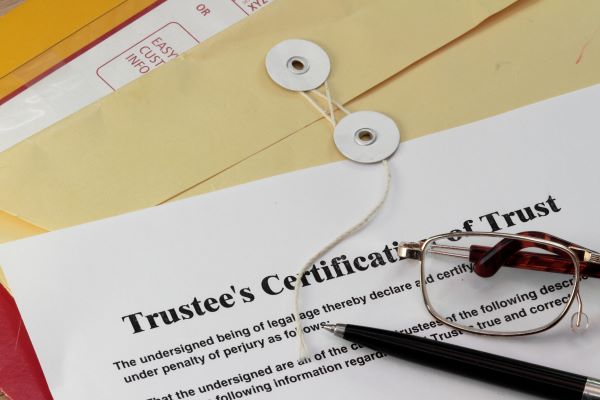Among older Americans, divorce and widowhood are at an all-time high, leading to new partnerships.…

Maintaining Your Estate Plan to Prevent Unnecessary Problems
When you die without a plan, your estate’s financial future and legacy to your loved ones rely on the courts to administer your state’s intestacy laws. Dying without an estate plan or a basic will creates confusion, work, and heartache for your family at a time when they should be mourning your loss. Aside from not having an estate plan, failing to review an estate plan every few years for life changes can unintentionally derail the effort and time put into it. Most people don’t understand the variety of situations that could impact their will, trust, tax situation, and more, causing big problems in the future.
Reasons for Reviewing your Estate Plan
Review your will, trusts, and beneficiary designations at a minimum every five years or when there is a shift in family dynamics such as birth, death, marriage, divorce, and infirmity. Your assets may have grown, sold, lost, or been spent. Minor children will require guardianship if something happens to you, and you can name a guardian in your will. A child with special needs may require a trust to provide extra financial help without affecting eligibility for government benefits. Many life experiences and outdated forms can render your estate plan ineffective because it does not represent your current situation.
Planning for Disability
Many older American workers believe their risk of disability before retirement is very low. However, according to the Society of Actuaries (SOA), one in seven workers will experience a disability lasting five years or more before they reach retirement age. Without planning, an unexpected disability will negatively impact your estate plan. Creating a trust document with your estate planning attorney can lessen the financial stress of health care costs due to a disability. Establishing a durable power of attorney to legally make decisions on your behalf also helps you control aspects of your daily life and permit long-range decision-making if necessary.
Including Nursing Home Care
Not pre-planning for nursing home care can devastate your estate, and if you have a spouse, it can ruin their long-term financial security. Because of the expense of long-term care, many people rely on Medicare funding. However, Medicare does not fund these expenses. Medicaid can, in some instances, provide this long-term care when a person’s financial resources are depleted; however, this creates a financial hardship for the remaining spouse in the household. An estate planning lawyer can present appropriate options for pre-planning for potential nursing home care.
Putting a Child on Your Home’s Deed
Often, an adult child will move in with their aging parents to alleviate the stresses of daily living. Unfortunately, this gives them title to your home, and in the worst cases, they might sell the house, kick you out, keep the profits and not share with other beneficiaries. Even in the best scenario where the child does not take advantage, you still give them a taxable gift. An estate planning attorney can advise how to protect and transfer real estate and minimize tax consequences.
Choosing an Estate Executor
Choosing an executor or personal representative is an important decision. Selecting the wrong person to administer your estate can have dire consequences. A surviving spouse who’s grieving may be too overwhelmed to manage the probate process. They may have a limited understanding of investments, finances, or tax laws to manage a larger estate or trust. Some adult children may disagree with your estate decision-making, and you may have concerns they will not fulfill the terms of your will. Still, other children may not act responsibly as trustees or guardians because of spendthrift habits. Identifying a responsible and capable executor is crucial to proper estate administration.
Coordinating Beneficiaries
It can be an expensive oversight if you forget to update the beneficiaries of your retirement accounts (401(k)s, IRAs), annuities, and life insurance policies. These retirement accounts are often the more significant assets in an estate. For instance, an ex-spouse might receive these assets if you forget to change the beneficiary designation. A secondary beneficiary should also be named to these account types if possible, as you may outlive the first selection. Know that beneficiary designations will take priority over a will.
Life Insurance and Estate Tax
Individuals with wealth may also have very large life insurance policies, which may inadvertently create estate taxes for their heirs. While life insurance payouts are not subject to state or federal income taxes, if the benefit is large enough, it may still be subject to estate tax if the insured had “incidents of ownership” when they died. Your estate planning attorney can circumvent the estate tax consequences of a large life insurance policy by creating an irrevocable life insurance trust for the intended heir.
Titling Specific Assets to a Trust
By creating a trust account, you may protect assets from creditors, ensure your heirs can easily acquire their inheritance, and keep details of your financial affairs private. However, if you fail to move assets into the trust, its creation is worthless. It is necessary to retitle the assets you want in the trust into the name of that trust. Forgetting to retitle assets into a trust means they will still go through probate.
Making Gifts to Reduce Estate Tax
For larger estates, it is possible to gift loved ones a certain dollar amount each year without incurring any gift tax. This annual gift tax exclusion will be $17,000 per individual in 2023. Many people fail to take advantage of yearly gifting, which can reduce the impact of estate taxes when you die and provide a significant benefit to your loved ones. As the estate tax laws permitting increased inheritance before federal estate tax is applied expires in 2026, gifting to reduce your overall estate assets over time may benefit your estate’s tax situation.
The complexity and ever-changing laws that govern inheritance on a state and federal level make it easy to take the wrong actions, even with the best intentions. Working with an estate planning attorney can create a plan to protect your estate, keep your documents current, and provide the most advantageous inheritance situation for your family members when you are gone.
We hope you found this article helpful. Please contact our Nashua office at (603) 881-9161 or our Woburn office at 978-458-4566 and schedule a consultation to create or update your estate plan! We look forward to the opportunity to work with you.



